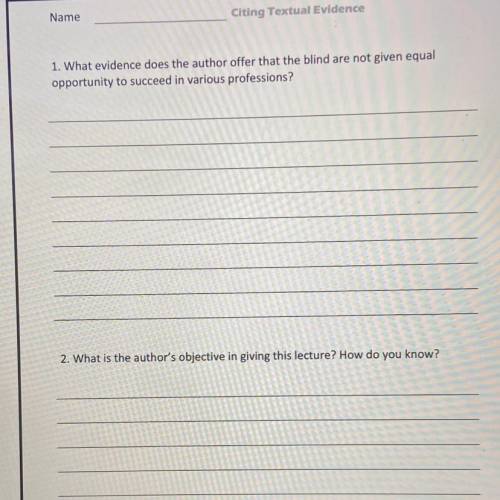
English, 22.05.2020 21:11, ramentome7542
The passage below is from the book Five Lectures on Blindness by Kate M. Foley. Read the passage. Then answer the questions.
When mentally equipped, all blind students should be sent to college, and urged to fit themselves as teachers. In every college and university blind men should occupy chairs in history, English, economics, and mathematics. I know two blind men in this state well qualified to teach any of these subjects, who are forced to accept inferior positions, because educators generally fail to realize that blindness is no bar to mental attainment, and that the ability to teach does not depend upon the ability to see with the eyes. This will be better understood when the coeducation of blind and seeing children becomes more general—God speed the day! As music teachers, concert players, leaders of orchestra, or masters of the violin and 'cello, the blind should have an even chance of success, but their inability to read music at sight, or watch the director's baton often deprives them of positions which their quick ear and well trained memory would enable them to fill with profit to themselves and satisfaction to the public.
And so in all the professions. I know a man who, before he lost his eyesight, was considered an eminent lawyer, but now his associates regard him pityingly, and his clients take their business elsewhere. When the light went out of the eyes of this brilliant man, it did not take his brain as well. He is fitted to be a consulting lawyer or court pleader, and could occupy a chair in a college of law. Surely, there is something radically wrong when these conditions exist! Surely the public needs to open its eyes, and polish its glasses in order to see more clearly that there is a mental blindness, more pitiful, more far‐reaching in its consequences, than physical blindness, however hard or uncomfortable the latter condition may be. Someone facetiously suggested that I call this lecture "bringing light to the seeing," and, in a sense, this is what I am trying to do. But the light is carried by a kindly hand, and the hand is the index to a heart in which there is no bitterness, no malice, no distrust―a heart brimming over with love, with hope, with confidence, and with a belief that the public will see the light, and, seeing it, and reading my message in its beams, will pass it on to others, adding to it as it goes, until it floods every corner of our vast state, and result in untold good for my people.
The questions
1. What evidence does the author offer that the blind are not given equal
opportunity to succeed in various professions?
2. What is the author’s objective in giving this lecture? How do you know?


Answers: 2
Other questions on the subject: English

English, 22.06.2019 05:00, kiarakagni
Excerpt from the prophet kahlil gibran and think not you can direct the course of love, for love, if it finds you worthy, directs your course. in this line from the passage, what does the word course mean? a) a mode of action or behavior b) a part of a meal served as a unit c) a designated area of land or water d) a continuous layer of building material
Answers: 1

English, 22.06.2019 06:00, tristan4233
How does crane's depiction of the way information was spread in the nineteenth century affect the novel? crane seeks to use the novel as a way to criticize the journalists of the time for how they glorified war as a means of union propaganda. by depicting the extent to which newspapers were circulated, crane seeks to expose the lack of unbiased reporting at the time. by giving newspapers a major role in the novel, crane seeks to make a connection between the increasing role of the military in national affairs and the decline of farming. crane captures the power of journalistic reports at a time when it was the primary means of transmitting information to a broad audience by showing its influence on henry.
Answers: 1

English, 22.06.2019 06:50, lululoveee3433
Tobias wolff most likely named his short story "mortals" because the story explores the theme of people coming to terms with the idea that one day they too will die. wanting to find out what their loved ones really think of them. achieving immortalit by being "big people" while they are alive. hoping that they will have accomplished something before they die.
Answers: 1

English, 22.06.2019 07:30, rachael382
Which characteristic is common to memoirs? a. they analyze all sides of a particular issue. b. they give the entire life story of an author. c. they may include fictional characters. d. they are written in first-person point of view.
Answers: 1
Do you know the correct answer?
The passage below is from the book Five Lectures on Blindness by Kate M. Foley. Read the passage. Th...
Questions in other subjects:


History, 21.04.2021 15:10

English, 21.04.2021 15:10






Mathematics, 21.04.2021 15:10






